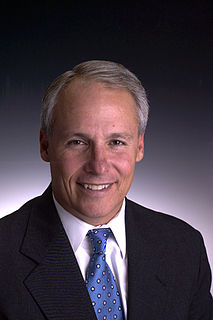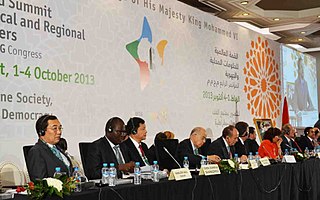
The United Nations Environment Programme (UNEP) is responsible for coordinating responses to environmental issues within the United Nations system. It was established by Maurice Strong, its first director, after the United Nations Conference on the Human Environment in Stockholm in June 1972. Its mandate is to provide leadership, deliver science and develop solutions on a wide range of issues, including climate change, the management of marine and terrestrial ecosystems, and green economic development. The organization also develops international environmental agreements; publishes and promotes environmental science and helps national governments achieve environmental targets.

The United Nations Development Programme (UNDP) is a United Nations organization tasked with helping countries eliminate poverty and achieve sustainable economic growth and human development. Headquartered in New York City, it is the largest UN development aid agency, with offices in 170 countries.

Agenda 21 is a non binding action plan of the United Nations with regard to sustainable development. It is a product of the Earth Summit held in Rio de Janeiro, Brazil, in 1992. It is an action agenda for the UN, other multilateral organizations, and individual governments around the world that can be executed at local, national, and global levels. One major objective of the Agenda 21 initiative is that every local government should draw its own local Agenda 21. Its aim initially was to achieve global sustainable development by 2000, with the "21" in Agenda 21 referring to the original target of the 21st century.

Martin Joseph "Marty" Chávez is an American politician, businessman, and attorney who served as a member of the New Mexico Senate from 1987 to 1993 and as the 26th and 28th mayor of Albuquerque, New Mexico. He served as the Executive Director of ICLEI Local Governments for Sustainability USA. and Chairman of the Advisory Board for the Center for Green Schools at U.S. Green Building Council. In 2012, he unsuccessfully sought the Democratic nomination for the Congressional seat being vacated by Martin Heinrich, who retired from the House to run for Senate.
The United Nations Global Compact is a non-binding United Nations pact to encourage businesses and firms worldwide to adopt sustainable and socially responsible policies, and to report on their implementation. The UN Global Compact is a principle-based framework for businesses, stating ten principles in the areas of human rights, labor, the environment and anti-corruption. Under the Global Compact, companies are brought together with UN agencies, labor groups and civil society. Cities can join the Global Compact through the Cities Programme.

The United Nations Institute for Training and Research (UNITAR) is a dedicated training arm of the United Nations system. UNITAR provides training and capacity development activities to assist mainly developing countries with special attention to Least Developed Countries (LDCs), Small Island Developing States (SIDS) and other groups and communities who are most vulnerable, including those in conflict situations.
The Earth Institute is a research institute at Columbia University that was established in 1995. Its stated mission is to address complex issues facing the planet and its inhabitants, with a focus on sustainable development. With an interdisciplinary approach, this includes research in climate change, geology, global health, economics, management, agriculture, ecosystems, urbanization, energy, hazards, and water. The Earth Institute's activities are guided by the idea that science and technological tools that already exist could be applied to greatly improve conditions for the world's poor, while preserving the natural systems that support life on Earth.

ICLEI – Local Governments for Sustainability is an international non-governmental organization that promotes sustainable development. ICLEI provides technical consulting to local governments to meet sustainability objectives.

The C40 Cities Climate Leadership Group is a group of 97 cities around the world that represents one twelfth of the world's population and one quarter of the global economy. Created and led by cities, C40 is focused on fighting climate change and driving urban action that reduces greenhouse gas emissions and climate risks, while increasing the health, wellbeing and economic opportunities of urban citizens.

United Cities and Local Governments (UCLG) is an umbrella international organisation for cities, local and regional governments, and municipal associations throughout the world that is concerned with representing and defending the interests of local governments on the world stage.
The Cities for Climate Protection program (CCP) is one of three major global transnational municipal networks aimed at reducing urban greenhouse gas emissions. Established in 1990 by the International Union of Local Authorities and the United Nations Environment Programme, one of the largest global transnational networks, the International Council for Local Environment Initiatives (ICLEI), presented a framework to represent local government environmental concerns internationally. The ICLEI strives to ‘establish an active and committed municipal membership… that promotes environmental and sustainable development initiatives within…[a] framework of decentralised cooperation’. ). In 1993, Subsequent to an ICLEI successful pilot scheme, the Urban CO2 Reduction Project, the CCP program was established during the post-Rio Earth Summit era. The CCP program illustrates itself within local climate policy, as a Transnational governance network.

Lakshmi Murdeshwar Puri is a former assistant secretary-general at the United Nations and the former deputy executive director of UN Women. Prior to her 15-year stint at the United Nations, she served as an Indian diplomat for 28 years. From 1999 until 2002, she was India's Ambassador to Hungary, while also concurrently accredited to Bosnia and Herzegovina.

The Climate and Development Knowledge Network (CDKN) works to enhance the quality of life for the poorest and most vulnerable to climate change. CDKN does this by combining research, advisory services and knowledge management in support of locally owned and managed policy processes. It works in partnership with decision-makers in the public, private and non-governmental sectors nationally, regionally and globally.

Peter W. Heller ) is a former Deputy Mayor of the City of Freiburg im Breisgau/Germany, environmental scientist, and venture philanthropist.
Arcot Ramachandran (1923-2018) was an Indian scientist, anthropologist, author and a former Under-Secretary General of United Nations Centre for Human Settlements, known for his scholarship on the subjects of heat and mass transfer and environment and his social commitment to the cause of sustainable development. The Government of India honoured him in 2003, with the Padma Bhushan, the third highest civilian award, for his services to the fields of Science and Engineering.

Mauricio Esteban Rodas Espinel is an Ecuadorian lawyer, social policy consultant, and politician who served as the Metropolitan Mayor of Quito between May 2014 and May 2019. After working in other Latin American cities, including Mexico City, he returned to Ecuador to enter politics. He founded the SUMA party, and was the youngest person every to be elected as Mayor of Quito.

The Global Covenant of Mayors for Climate & Energy was established in 2016 by bringing formally together the Compact of Mayors and the European Union's Covenant of Mayors. It is a global coalition of city leaders addressing climate change by pledging to cut greenhouse gas emissions and prepare for the future impacts of climate change. The Compact highlights cities’ climate impact while measuring their relative risk levels and carbon pollution. The Compact of Mayors seeks to show the importance of city climate action, both at the local level and around the world. The Compact was launched in 2014 by UN Secretary General Ban Ki-moon and former New York City Mayor Michael Bloomberg, the UN Special Envoy for Cities and Climate Change. The Compact represents a common effort from global city networks C40 Cities Climate Leadership Group (C40), ICLEI, and United Cities and Local Governments (UCLG), as well as UN-Habitat, to unite against climate change. 428 global cities have committed to the Compact of Mayors. The collective member cities comprise over 376 million people and 5.19% of the global population.
Shobhakar Dhakal is the Vice President for Academic Affairs at the Asian Institute of Technology, Thailand since April 2021. In the past he was Dean of School of Environment, Resources and Development, and Head of Department of Energy Environment and Climate Change of Asian Institute of Technology. His main areas of expertise are in energy policy, climate change mitigation and policies, policy modelling and analysis, and cities and climate change. Dhakal actively contributes to international and scientific arena.

Sustainable Development Goal 11 is about "sustainable cities and communities" and is one of 17 Sustainable Development Goals established by the United Nations General Assembly in 2015. The SDG 11 is to "Make cities inclusive, safe, resilient and sustainable". The 17 SDGs take into account that action in one area will affect outcomes in other areas as well, and that development must balance social, economic and environmental sustainability.
Climate change and cities are deeply connected. Cites are one of the greatest contributors and likely best opportunities for addressing climate change. Cities are also one of the most vulnerable parts of the human society to the effects of climate change, and likely one of the most important solutions for reducing the environmental impact of humans. More than half of the world's population is in cities, consuming a large portion of food and goods produced outside of cities. The UN projects that 68% of the world population will live in urban areas by 2050. Hence, cities have a significant influence on construction and transportation—two of the key contributors to global warming emissions. Moreover, because of processes that create climate conflict and climate refugees, city areas are expected to grow during the next several decades, stressing infrastructure and concentrating more impoverished peoples in cities.













